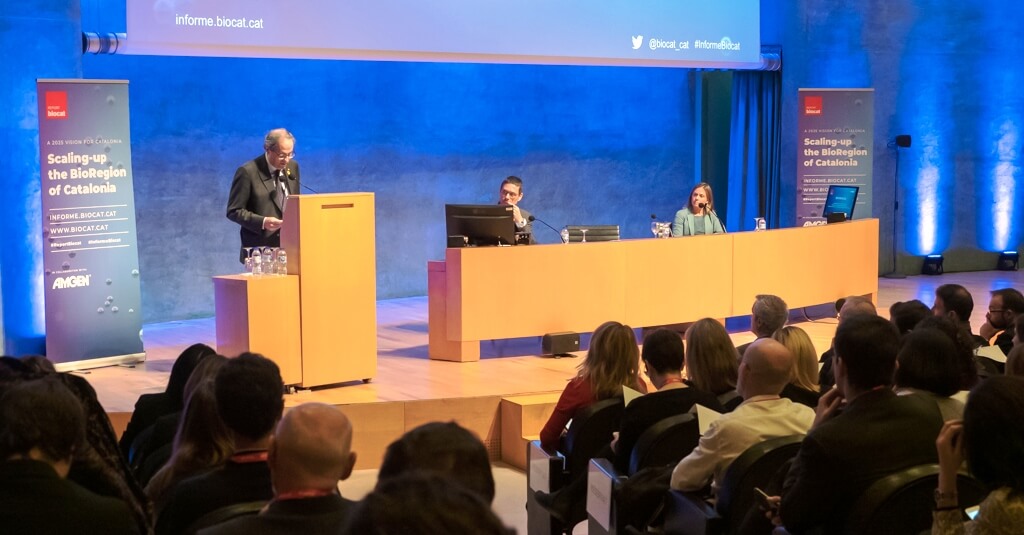
Biocat Report shows growth in international investment in BioRegion of Catalonia
More than 300 professionals from the sector attended the event to present a new edition of the Biocat Report, the benchmark study on the healthcare and life sciences sector in Catalonia. Under de title “Escaling-up the BioRegion of Catalonia”, the Biocat Report highlights the growing attractiveness of the life sciences and health sector for international investment –linked to the positioning of the BioRegion as a European hub in health research–, the increase in the number of companies and the occupation of sector, as well as the advance of innovation in health towards social impact. Biocat, the organization that coordinates and promotes the life sciences sector in Catalonia, has its headquarters in the Barcelona Science Park.
The presentation of the report, held at the AXA Auditorium and presided over by the President of the Government of Catalonia Quim Torra, with other representatives of the Government of Catalonia.
The meeting included the keynote by Dr. Daria Tataj, Founder of a strategy firm Tataj Innovation, and Chairwoman of the RISE High-Level Advisors to Carlos Moedas, European Commissioner for Research, Science and Innovation.
From the Parc Científic de Barcelona attended Maria Terrades, general director, and Anna Serra, director of Communication and Marketing.
10 times more international investors than five years ago
The Biocat report revelals that the healthcare and life sciences sector in Catalonia generates €31.087 billion each year and makes up 7.2% of the gross domestic product (GDP). In total, more than 223,000 people are employed in the sector, roughly 7% of all those working in Catalonia.
On average, a new company in the sector is created each week in Catalonia. The sector has 1,060 companies that employ nearly 58,000 workers and have a joint turnover of €17.802 billion, with an average year-on-year growth of 2.4% between 2020 and 2016.
Between 2015 and 2017, Catalan start-ups in the healthcare sector attracted €340 million in investment, three times more than in the 2013-2015 period, through 2014 investment operations. In 2018, companies raised €100.2 million from January to October and the sector is expected to surpass the investment attracted in 2017 this year (€107.3 million).
72% of all venture capital attracted by Catalan start-ups in the sector this year (specifically €42.7 million of a total of €60.9 million) was through rounds of funding with international participants. In addition to specialized local investors like Ysios Capital, Caixa Capital Risc, HealthEquity, Inveready and Alta Life Sciences, the Biocat Report highlights the significant growth in foreign investors committing to Catalan companies in the healthcare sector. In just 10 years, the number of foreign investors participating in these companies has gone from 0 to 50 and over the past five years alone, the figure has increased tenfold. Most of them are from North America.
The capital raised through rounds of investment with international participants has also doubled in recent years, from €85 million in 2013-2015 to €211 million in 2016-2018.
Bringing top-notch science to patients
In terms of GDP and population, Catalonia is comparable to EU countries like Sweden, Belgium, Denmark, Austria or Ireland. The region even surpasses these countries in terms of some of the indicators of research success: for example, Catalonia has received just as many grants from the European Research Council (ERC) since 2007 as Belgium and Sweden; and the number of articles published in Nature between 2013 and 2017 signed by researchers from the BioRegion of Catalonia is similar to that of Belgium and greater than that of Austria and Finland.
Catalan biotechnology companies are currently developing 18 potential drugs, 11 more than in 2013. Three potential drugs are already in phase III.
Recommendations for the future
The Biocat Report also includes a series of recommendations to consolidate the scale-up of the sector over the coming years. These include better incentivizing technology transfer for researchers; fostering closer collaboration among scientists, pharmaceutical companies and investors to define proof-of-concept initiatives more specifically; strengthening local drug discovery platforms; providing specific public funding; further integrating CatSalut to optimize clinical trials; improving the capacities of the Catalan healthcare innovation system and implementing programs for innovative public procurement.
►The main data from the Biocat Report is reflected in informe.biocat.cat.
► Executive summary [+info]




